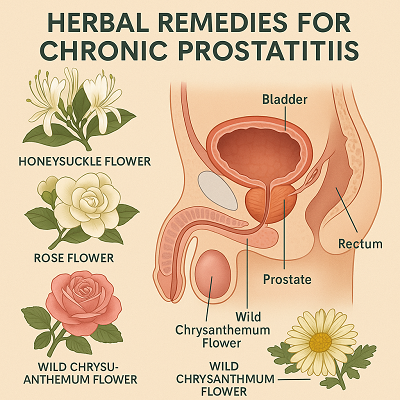Herbal Remedies for Chronic Prostatitis: Natural Treatment with Medicinal Flowers
Chronic prostatitis, a common urological condition among men, not only causes physical discomfort but also often leads to psychological stress and emotional distress. In Traditional Chinese Medicine (TCM), the pathogenesis of chronic prostatitis is multifaceted, frequently involving damp-heat accumulation, blood stasis, and qi stagnation.

While modern treatments such as antibiotics and herbal formulas like the Diuretic and Anti-inflammatory Pill can offer relief, TCM also emphasizes the therapeutic potential of natural herbs and flowers. Guided by the principles of "food and medicine from the same source" and "healing through the lightest touch," floral therapies can harmonize internal imbalances and restore health without harsh side effects.
1. Clearing Heat and Dissipating Internal Fire
Sophora Flower, Gardenia Flower, Honeysuckle Flower
In cases where dampness and heat are both present, with heat being the dominant factor, patients may experience symptoms like burning urination, dark yellow urine, urethral pain, bitter taste in the mouth, dry throat, and constipation. These are signs of excessive internal heat. In such scenarios, treatment focuses on clearing heat while supporting the elimination of dampness via urination.
The Huangdi Neijing (Yellow Emperor's Classic of Medicine) suggests that "fire depression must be released." In this context, light and cooling flowers can help dissipate pathogenic heat, purify the urogenital system, and restore balance:
Sophora Flower (Huai Hua): Bitter and salty in taste, slightly cold in nature, it enters the kidney and lower burner, effectively clearing heat from the lower abdomen and stabilizing the reproductive system.
Gardenia Flower (Zhi Zi Hua): Clears heat from the triple burners. It soothes the mind by eliminating excess heart fire, awakens the spleen by reducing middle burner heat, and promotes urination by eliminating lower burner damp-heat.
Honeysuckle Flower (Jin Yin Hua): Sweet and cold, it is excellent for eliminating heat toxins in the blood. Unlike heavy bitter herbs that may block qi circulation, honeysuckle is aromatic and dispersing, making it ideal for gently expelling pathogenic heat.
2. Transforming Dampness with Aromatic Herbs
Inula Flower, Fingered Citron Flower, Magnolia Flower
When dampness is the predominant issue, patients often exhibit symptoms such as cloudy urine, post-urination dribbling, and moistness in the scrotal area. According to Li Shizhen, "the Earth element (spleen) favors warmth and fragrance," indicating that aromatic herbs are key to eliminating dampness from the spleen.
Aromatic flower herbs enter the spleen meridian, awaken its function, resolve dampness, and regulate qi circulation:
Inula Flower (Xuan Fu Hua): Pungent and slightly warm, based on Zhang Zhongjing's classic Inula Decoction. It reduces damp turbidity and improves liver meridian circulation.
Fingered Citron Flower (Fo Shou Hua): Yellow in color, it enters the spleen and stomach. With a balanced nature and moderate drying ability, it moves qi and resolves damp accumulation in the middle burner.
Magnolia Flower (Hou Po Hua): Pungent, bitter, and warm, it dispels dampness, promotes qi flow, and eliminates foulness. Unlike other Magnolia parts, the flower is less likely to damage body fluids.
3. Soothing the Mind and Relieving Emotional Distress
Clove Flower, Albizia Flower, Magnolia Bud
Chronic prostatitis is not just a physical challenge—it often comes with emotional burdens such as anxiety, irritability, mood swings, and depression. TCM believes that emotional stagnation disrupts qi flow and can lead to or worsen disease.
To address this, renowned physician Ye Tianshi advocated: "Use bitterness to clear heat without harming the stomach; use pungency to move qi without scattering essence." Flowers with light, dispersing properties can soothe the liver, regulate emotions, and promote restful sleep:
Clove Flower (Ding Xiang Hua): Warm and dispersing, it warms the lower burner and restores proper qi flow, promoting urination and alleviating stagnation.
Albizia Flower (He Huan Hua): Literally translating to "happy together," this flower has a sweet and neutral nature. It lifts the mood, relieves emotional constraint, and calms the mind.
Magnolia Bud (Xin Yi Hua): With ascending, dispersing properties, it clears heat from the upper orifices. In prostatitis, this aligns with the TCM strategy of "treating lower illnesses from the top," enhancing urination and relieving lower body tension.
4. Invigorating Blood and Removing Stasis
Motherwort Flower, Rose Flower, Wild Chrysanthemum Flower
From a TCM standpoint, the prostate must remain "unobstructed to function well." Blood stasis is often behind chronic pelvic pain in prostatitis, manifesting as persistent discomfort, heaviness, dull or sharp pain in the lower abdomen, perineum, scrotum, and sometimes radiating to the anus or inner thighs.
In such cases, it's important to avoid heavy, harsh medications that could further block qi or deplete blood. Instead, light and dispersing flowers help remove localized stasis and improve circulation without taxing the system:
Motherwort Flower (Yi Mu Cao Hua): Enters the lower burner, especially effective for gynecological and pelvic conditions. It moves blood and drains dampness without stagnating in one area.
Rose Flower (Mei Gui Hua): Highly aromatic, it soothes the liver, awakens the stomach, regulates qi, and promotes blood circulation. Its gentle nature avoids the harshness of stronger blood-moving herbs.
Wild Chrysanthemum Flower (Ye Ju Hua): Pungent, bitter, and slightly cold, it clears toxic heat, resolves liver qi stagnation, and dissipates blood stasis in the pelvic area.
Conclusion
In TCM, medicinal flowers are more than beautiful blossoms—they are therapeutic agents capable of transforming internal imbalances. When used appropriately, these herbs can clear heat, resolve dampness, promote circulation, and soothe the mind. For men suffering from chronic prostatitis, incorporating botanical therapies into a comprehensive treatment plan—especially alongside remedies like the Diuretic and Anti-inflammatory Pill—can offer a gentle yet powerful path to long-term relief.
"Sometimes the lightest touch carries the greatest force." The elegant healing power of flower medicine embodies this principle, achieving real clinical effects with grace and precision.



